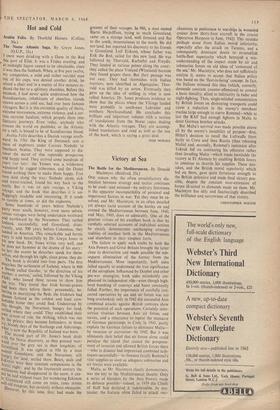Victory at Sea
The Battle for the Mediterranean. By Donald Macintyre. (Batsford, 25s.)
ONE reason why the often unsatisfactory dis- tinction between strategy and tactics continues to be used—and misused—by military historians is the apparent incompatibility of personal and impersonal factors in war. Yet they must be re- solved, and Mr. Macintyre, in an often detailed yet always lucid account of the battles on and around the Mediterranean between June, 1940, and May, 1943, does so admirably. One of the greatest virtues of his excellent book is that by carefully selected accounts of individual actions he clearly demonstrates unchanging strategic realities of warfare both in the Mediterranean and elsewhere in their simplest form.
The failure to apply such truths by both the Axis Powers and Great Britain brought the latter close to destruction and made possible the sub- sequent elimination of the former from the Mediterranean. Most importantly, both sides failed equally to understand the true significance of the aeroplane. Influenced by Douhet and other pre-war strategists, both sides mistakenly em- phasised its independent role—even though high- level bombing of convoys and bases constantly failed. Further, the importance of carefully con- certed operations by sea and air forces was too long overlooked; only in 1942 did successful Axis combined attacks against British convoys show the potential of such operations. Certainly inter- service rivalries between Axis air forces and navies, and a reluctance to repeat the massacre of German paratroops in Crete in 1941, partly explain the German failure to eliminate Malta— by invasion or starvation—by 1942. But it was ultimately their belief that air forces alone could paralyse the island that caused the postpone- ment of invasion and allowed British forces there —who in disaster had improvised combined tech- niques successfully—to threaten fatally Rommel's vital supplies as soon as adequate submarine and air forces were available.
Malta, as Mr. Macintyre clearly demonstrates, was the key to the Mediterranean theatre. Only a series of blunders by the Axis Powers made its defence possible—indeed, in 1939 the Chiefs of Staff had declared it indefensible. In par- ticular, the Italians often failed to attack mer- chantmen in preference to warships (a wounded cruiser drew thirty-four aircraft in the crucial Operation Harpoon in June, 1942). This mistake perhaps arose from Italian moral inferiority, especially after the attack on Taranto, and a consequently dominant desire to re-establish battle-fleet superiority which betrayed a mis- understanding of the impact made by air and submarine forces on old ideas of 'command of the sea.' Mr. Macintyre, who does not sufficiently analyse it, seems to accept that Italian policy was based on the 'fleet-in-being' concept. In fact, the Italians misused this idea (which, correctly, demands constant counter-offensives) to conceal a basic timidity, allied to inferiority in radar and night-fighting. Thus, single-minded concentration by British forces on destroying transports could cause a reduction in the enemy's merchant marine large enough to starve Rommel—while at last the RAF had enough fighters in Malta to deter German bomber attacks.
But Malta's survival was made possible above all by the enemy's instability of purpose—first, Hitler's decision to recall the Luftwaffe from Sicily to Crete and then Russia (thus releasing Malta) and, secondly, Rommel's insistence after Tobruk fell on continuing his offensive rather than invading Malta—which made inevitable the victory at El Alamein by enabling British forces to continue to throttle his supplies. These mis- takes, and the British moral superiority which fed on them, gave quite fortuitous strength to the British defensive and made final victory pos- sible, despite the constant over-extension of forces ill-suited to demands made on them. Mr. Macintyre has ably and fascinatingly described the brilliance and narrowness of that victory.
CHRISTOPHER MAKINS


































 Previous page
Previous page